Contents
What is Relationship Counselling?
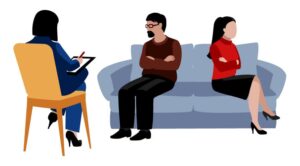
Relationship counselling is a way of healing. It’s a process that helps people who are struggling with relationships or marriages to get back on track. Relationship counselors will help individuals and couples understand what they want from their relationships. It also helps them to know how to communicate more effectively. It resolves conflicts in better ways. This helps to find solutions for challenges that arise within the relationship.
Relationships are hard. Trying to balance the emotional, physical and financial needs of two people is difficult at best. The most successful relationships are those that have an open dialogue about their goals for the future. They also communicate openly with one another when they’re feeling frustrated or angry about something in the relationship.
Counseling can be a valuable resource to help couples navigate these issues together, but it’s important that you find someone who is qualified and knowledgeable on this topic before starting therapy.
Types of Relationship Counselling
There are three main types of relationship counselling services are:
Marriage Counselling
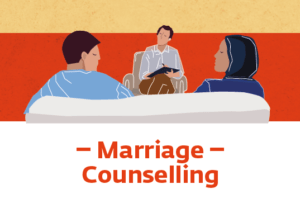
Marriage counselling helps married couples facing difficulties in communicating with each other, exploring underlying causes of these problems, building trust, and enhancing feelings of personal safety in the relationship. This counselling can take place over a series of sessions, but the process is not intended to solve all problems in a marriage. Rather, it focuses on helping couples strengthen or rebuild their emotional bond and improve communication between them.
Once they have established an effective mode of communication with each other and strengthened their trust, they will be able to discuss more openly with each other about issues that bother them in their relationship and come up with mutually acceptable solutions. If necessary, the counselor can suggest marriage therapy for deeper and more complex marital issues when appropriate.
Premarital Counselling
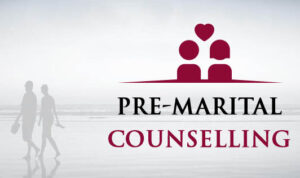
In this type of counselling, a couple gets to know each other better as individuals and as partners. This type of counseling is the first stage in developing healthy relationships.
The objectives are to assess the level of readiness for marriage and compatibility between partners. It is aimed at couples who are about to get engaged or marry. Couples will be asked to put their relationship under the microscope, looking at areas such as beliefs, values, communication styles, and expectations about relationships. They may also be counseled on how they can resolve conflict within the context of their specific culture. If necessary, the counselor can suggest marriage counseling for deeper and more complex marital issues when appropriate.
Relationship Enhancement Programme

The REP is a workshop for couples who are still dating. The objective is to enhance the relationship’s ability to weather life’s challenges by building intimacy, communication, and conflict management skills that can be carried forward into married life. It is not intended as a replacement for marriage counseling nor does it aim to solve all problems in a relationship. Rather, it focuses on helping couples explore their personal needs and develop mechanisms with which they can communicate more effectively with each other about issues that bother them in their relationship. If necessary, the counselor can suggest marriage counseling for deeper and more complex marital issues when appropriate.
Different Relationship Issues
Relationships are complicated. They aren’t always easy to navigate, especially when challenges come up within the relationship or if you feel like your partner isn’t meeting certain needs. Relationship Issues differ from relationship to relationship. However, there are certain issues that can be common for all couples even if they are married. These issues are:
Emotional Disconnection From Your Partner

Sometimes it feels like you’re just going through the motions, and that nothing is being felt or said between you two. Maybe one of you has fallen out of love with the other person, but doesn’t want to admit things aren’t what they used to be? This can also come about when there’s a lot of subtle tension between you two, so much so that it’s hard to open up about your feelings.
Rutted Relationship Dynamics
Relationships are all about the small things- like knowing what to say or how to act when something is off with your partner. Sometimes this can become routine and expected for one person more than another, leaving the other person out of the loop. It’s almost like one person is in a rutted relationship dynamic, while their partner is trying to figure things out and feel included again.
Disinterest with Each Others’ Interests

If you don’t have anything in common or are interested in different things then it can be difficult to relate to each other. Maybe you used to enjoy spending time together, but now it’s just not the same? Sometimes this is because of simple things like having different hobbies or wanting to go on vacation in different places than your partner does.
No Time For Each Other
It can be tough to gauge how much time you should spend with your partner, especially when one of the two people works long hours in another city/state/country. Sometimes it feels like they’re never around- and worse still, there’s a growing resentment from both sides. Maybe you used to enjoy time apart, but now it’s become an issue?
Lack of Love & Appreciation
You used to love spending time with them and everything was perfect- now your feelings feel totally different? This can happen when one of you isn’t putting in as much effort as the other, or when you spend too much time together and start to get on each others’ nerves. It may be a good idea for one of you to take some space away from your partner- not because there’s anything wrong with them but simply because it feels like love & appreciation have faded away over time.
No Efforts For Each Other

If you’re not putting in the effort, it can be difficult for your partner to get out of their comfort zone and do something special. And if they don’t make an effort- then you feel like there’s no point! If you haven’t treated them well lately or made time for them recently, that could explain why they’re not making an effort.
Lack of Trust & Respect
Trust and respect is a very important part of any relationship, but it can also be easy to take for granted if things are going smoothly. If you feel like your partner doesn’t have much confidence in you or thinks the worst about you behind closed doors- then that’s a problem.
Communication Gap

The way a couple communicates can affect their relationship. Some people like to talk about things and feel more connected that way, but others prefer being hands-on by getting things done for themselves or with other people in order not dwell too much on thoughts they would rather leave behind if possible. When conflicts arise from one partner thinking he/she knows best while the other disagrees this may lead to an argument where both have valid points which shouldn’t be fought over because it just ends up hurting feelings even more than anything else does already.
Different Goals & Plans
If you’re on totally different pages about where your relationship is heading- that could be a problem! When one person feels like they’ve been talking about marriage/kids/moving in with each other forever but nothing has actually happened- it can feel pretty discouraging.
Not Feeling Like Your Old Self Anymore
When relationships become stagnant or when one half loses interest in keeping up with trying new things to keep the spark alive, this can lead to dramatic changes for both sides which could mean breaking up.
Lack Of Sex Drive

If your partner is losing their drive and you’re not into it anymore. Then that’s not a good sign for your relationship at all. You should never feel like you have less of an important role than they do.
Making Sure It Isn’t Just A Phase
Sometimes people go through phases where they lose interest but once that phase passes, everything goes back to normal again so make sure it isn’t just something temporary before making any decisions about ending whatever kind of relationship you have.
Infidelity
If you feel like your partner is being unfaithful, it might be a sign that they aren’t really into the relationship anymore.
When Should You Consult Counselor?

Dwindling love and competing interests can lead to a separation, but the first step is relationship therapy. It may be too late for the save-ourselves kind of thing when you see your spouse chatting happily with someone else; these moments should have been addressed much earlier in order to reap any benefits from them later down the road. If there are signs that indicate this might not just be some passing phase – like constant fights over who does something better or worse at home/work alike. Then consider consulting an expert as soon as possible before more damage has been done. These signs are:
- If you feel that your relationship is beyond any help
- When there is a lack of communication between you and your partner
- When the problem has been going on for so long (often more than one year) that it seems like there is no hope left for resolution
- If you want to make things between you and your partner a lot simpler.
- When you want to improve your relationship.
- If your relationship is highly destructive and you feel suicidal thoughts may enter your mind.
What To Look For In A Counselor?
Find someone with who you can work. Perhaps ask some close friends if they have ever worked with anyone they recommend. If you know of anyone whom you think may be good, then contact their office to see if they take your health insurance provider or not. When checking out counselors, consider asking some questions such as:
- How many years of experience do they have?
- What is their education in the area of psychological therapies?
- How many couples do they see weekly?
- Will you be able to meet with your counselor together or will you need separate sessions?
- What is the fee for an initial consultation?
How does Relationship Counselling Help?
For couples and families who are struggling, relationship therapy can be the key that unlocks their problems. If one person is unwilling or unable to attend alone it may help for them to consult a therapist in order to resolve issues within themselves first so they have enough energy left over from fighting with you about what’s wrong
The right professional guidance will allow both parties involved to come out of counseling feeling more empowered than ever before.
Benefits of Relationship Counselling
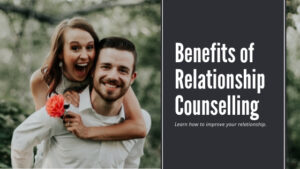
- It improves your Communication: It helps you to improve the communication between the two partners. This helps you to understand your partner better and express yourself without judging them.
- It improves Trust: Counselling heals the issues that are causing mistrust between partners which can lead to a stronger relationship.
- It reduces Demands for Perfection: Counselling teaches you how to accept each other’s flaws, making it easier for both individuals in the relationship.
- Increase Intimacy Level: Counsellors help couples reconnect with their feelings of closeness and intimacy through counseling sessions by encouraging self-disclosure which brings about emotional connection.
- Setting Goals together: The counselor will also help sets goals for existing problems during therapy so that you can achieve these goals outside of therapy as well! This way there is no relapse of the issues.
- It enhances your bond: Counselling helps you to strengthen your bond with each other through the counseling sessions.

- It prevents Divorce: Couples who go for relationship counseling are less likely to get divorced than couples who don’t because they learn how to communicate with their partner better and find out ways in which both of them can work together towards a common goal.
- It builds self-esteem: Counselling helps you to accept yourself and your partner’s flaws. This boosts the self-esteem of individuals in a relationship which can improve relationships with other people too.
- This helps you in Mental and Physical Health: Counselling has been linked with better mental health in general, and it also helps to manage physical symptoms.
- It makes you happy: One of the benefits of counseling is that it makes you happy. By resolving issues in your relationship, you can experience relief from stress. It will make both individuals feel more relaxed and peaceful.
- It improves Relationship Quality: Counselling helps couples to improve their relationship quality by increasing social support networks, improving communication skills, developing conflict resolution strategies, reducing dependence on one another for meeting personal needs, etc.
Therapies in Relationship Counselling?
The problem with relationship counseling, though, is that it can be difficult to know what type of therapy will work best for you and your partner. These are some types of therapies used in the relationship.
Insight Therapy
This type of therapy is focused on resolving the underlying issues that are causing your relationship problems. It helps you to find out why certain patterns or behaviors have been occurring in a person’s life and what types of things might be triggering these feelings. Insight therapies, such as psychodynamic approaches, can help people who feel stuck in their patterns to overcome them.
Cognitive Behavioral Therapy (CBT)
Cognitive Behavioral Therapy uses the principles of cognitive psychology and behaviorism. It helps to solve problems that are holding you back from achieving goals, solving issues, or changing behaviors. CBT is used for a wide variety of types of counseling including anxiety treatment, relationship counseling, and depression treatment.
Dialectical Behavioral Therapy (DBT)
DBT is a type of therapy that is used when people are having trouble controlling their feelings, emotions. It focuses on accepting your feelings. It helps both by learning how to better manage your relationships with others as well as yourself.
Existential Therapies
These therapies focus on the meaning behind life experiences. It is rather than just looking at what caused something to happen in the past. Existential counselors believe that you can resolve an issue or problem once you understand why it happened and where it fits into your overall journey through life. These types of therapists also help individuals look for ways they can make changes to improve. It also helps them both to analyze what they are individually and within society.
Gestalt Therapy
This type of therapy uses a holistic approach to helping people understand how their thoughts and feelings are connected. It encourages individual action in order to create an outcome that is right for the person. It does not encourage following a predetermined plan or structure. Gestalt therapies are applicable for every type of counseling. It includes career counseling, relationship counseling, and anxiety treatment.
Systemic Therapy
This type of therapy focuses on looking at a person as a part of their family system. It is to find out how they fit into the bigger picture. It can help partners who have been struggling with communication issues. This also helps those who go through any kind of transition such as divorce or job loss. This helps them better to understand what is going on in their lives.
Gottman Therapy
This type of therapy focuses on strengthening the relationship between partners so that they can become closer and more connected. It is centered around teaching couples how to communicate effectively. It can handle conflict in a way that will not hold them back from making progress. They will be able to understand each other’s needs. Gottman therapies are excellent for relationships where there is a high level of conflict. It is for those who feel like they are stuck and unable to move with the relationship.
Inner Child Therapy
This type focuses on helping individuals reconnect with their inner selves. It is to resolve those issues that were never taken care of. This was due to either emotional trauma or hurt. This can be a part of relationship counseling. It is so that partners can have an open and honest discussion. They can communicate how felt hurt in the past even if it was years ago.
Collaborative Therapy
This type of therapy focuses on working together to find a solution that will work best for both partners. It is often used when there are two very different ideas. These are about what types of solutions should be implemented or how they should be handled. It encourages compromise between each person’s choices and goals.
Narrative Therapy
The idea is that you create your own narratives and tell yourselves stories about what’s happening in the world around you. It is something called “narrative therapy.” This method is for couples who have unhealthy beliefs. These issues can be at fault for any kind of interpersonal problems.
Conclusion
Successful relationship counseling requires honesty, openness, and understanding from both parties involved. It is to clarify what you expect from your partner or loved one before beginning a relationship. If you are unable to do this initially, there may be room for further discussions at a later date. It is to achieve the best possible outcome for both parties involved.
For more information, please contact MantraCare. Relationships are an essential part of human life. It is the connection between people, and it helps us to form social bonds, understand and empathize with others. If you have any queries regarding Online Relationship Counseling experienced therapists at MantraCare can help: Book a trial therapy session
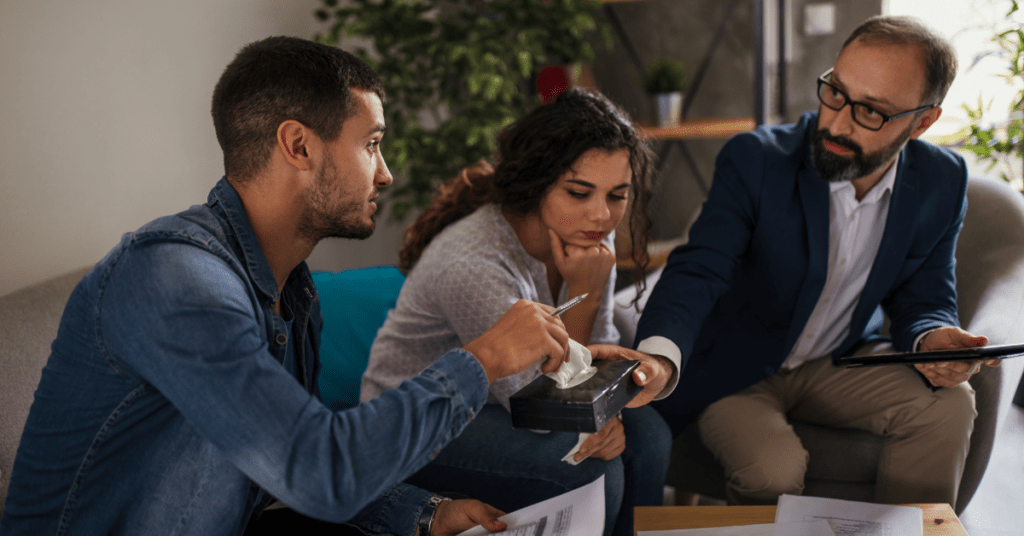


Comments are closed.